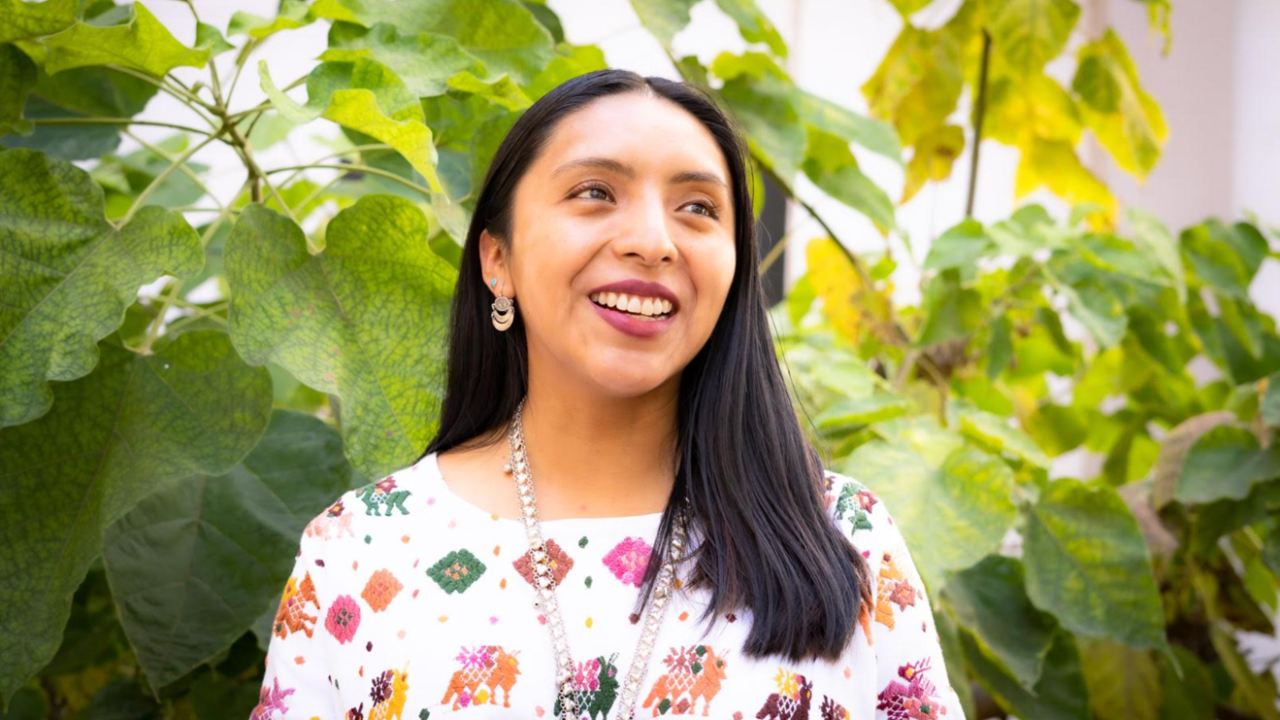
Ingrid Sub Cuc's Talk on Promoting Literacy in Kaqchikel Communities
Introduction:
Ingrid is Maya Kaqchikel/Q’eqchi from Iximulew (Guatemala) and a 2nd year PhD student in the Department of Native American Studies, UC Davis. She holds an M.P.H. in Global Health and a B.S. in Biology. Her scholarship focuses on recognizing the importance of Indigenous knowledge systems and languages as essential to the health and wellbeing of Indigenous communities. Last year, she piloted a literacy program in her community (with her mentor and community elder) to help Kaqchikel speakers gain literacy skills in their language. She hopes to continue growing this project to support the over half a million Kaqchikel speakers that reside in Guatemala and the United States.
During the Spring 2023 quarter, Ingrid gave a talk for the Cluster on Language Research entitled "Rutzib'axik Qach'ab'äl: Piloting the Application of Heritage Language Learning Methodologies in Two Kaqchikel Speaking Communities in Guatemala”. We interviewed Ingrid to learn more about her work!
Interview
1. In your talk, you addressed how "recognizing the importance of Indigenous knowledge systems and language is essential to the health and wellbeing of Indigenous communities." Given your background in biology and health, could you expand on the benefits to Indigenous communities and beyond more in detail?
In the last few decades, I believe that we have made significant strides in recognizing how colonial and imperialist systems and structures have negatively impacted the health and wellbeing of Indigenous communities and other historically marginalized populations around the world. Since 2019 we have seen institutions such as the CDC, American Association of Public Health, and others, declare racism a public health crisis. We also now have significant amount of data demonstrating how intergenerational trauma disproportionally effects Indigenous and Native communities who have survived genocide and other atrocities. All to say that the evidence supporting negative health outcomes due to racism, injustices, and inequalities is overwhelming. However, so is the evidence demonstrating Indigenous resilience and survivance amidst all this! Indigenous peoples have not only survived but thrived under extremely harsh colonial conditions. We have done so by relying on ancestral knowledge of medicine, ancestral wisdom such as language, culture, healing practices and so much more! Language is not just a means of communication for Indigenous people – it is the medium through which we understand our world, our existence, our relationships, and our responsibilities. By speaking our languages, we maintain our connections and relationships which greatly contribute to our wellbeing.
2. You explain the difference between fluency and literacy in your talk. What were some of the challenges and benefits of helping speakers of Kaqchikel gain skills to read and write in the language, and how do the communities themselves understand the benefits of literacy skills?
As I mentioned in my talk, there is not a lack of fluent speakers in my community – in fact there are approximately ½ a million speakers of Kaqchikel today. Yet, literacy skills that include reading and writing in our language are very lacking. Because many of us, who speak Kaqchikel, do not know how to read and write early on, we often don’t see any benefit in learning how to do so later. Once you possess those skills for the Spanish language that is usually enough to get you by in jobs and education. This continues to be the biggest challenge – proving to our own community that gaining literacy skills in our language is not only important, but it will change their lives in a positive manner. There are however a lot of people, both younger and older, who do see the value in our language and are creating music, poetry, podcasts, curriculum, and so much more in our language which is demonstrating the benefits of literacy.
3. What are some ways the various stakeholders (you and your partner, community elders, mentors, scholars, the participants themselves) complement each others' knowledge or fill in gaps regarding how to connect with and nurture trust within communities?
Cultivating trust and having a multi-disciplinary team were key to the success of this project. Our team included a community member and expert Kaqchikel language teacher, a linguist in training who is also a Kaqchikel language learner, and a Native/Indigenous studies academic that helped guide and shape the workshops and training materials. We all brought something important and needed to the project. We respect one another and our expertise. Our participants also contributed significantly because they provided feedback on what worked and what could be improved upon regarding this project.
4. Your pilot projects were conducted in Guatemala, and you're planning to expand the literacy program into the United States. In what ways do you anticipate adjusting the curriculum for Kaqchikel speakers according to these different contexts?
Migration has always been a part of the Indigenous story. Due to the increased effects of climate change and violence against Indigenous communities many Kaqchikeles are leaving their homelands and seeking opportunities in the United States. These community members are working in our farmlands, food processing companies, healthcare and education spaces and they are often doing so with little Spanish fluency and almost zero knowledge of English. There have been some efforts by organizations in the United State to create informational resources in Kaqchikel but even if those resources are in Kaqchikel, Kaqchikel speakers often do not know how to read them. Our curriculum therefore would focus on this – presenting written material that Kaqchikel speakers might encounter here in the diaspora.
